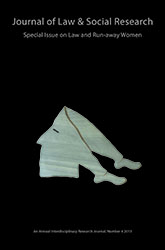Exploring the Issue of ‘Run-away Women’ in Pakistan: A Call for Social and Legal Change
DOI:
https://doi.org/10.7146/nnjlsr.v0i4.111097Abstract
Women are considered as vulnerable members of almost every society. In Pakistan the scenario is no different. ‘Run-away women’ is one of the socio-legal problems faced by women. Women who consider running away from their families often face difficult situations, which may result in being trapped into prostitution or even being murdered by their own families in certain cases. In runaway cases, the majority of women do return to their families after reconciliation. However, what happens to these women after reconciliation remains unknown.
This paper aims to highlight the causes of running away and its consequences in Pakistani society. It also intends to examine the existing legal mechanisms and their role in dealing with this problem. This study also analyzes the Islamic and customary laws of Pakistan to identify whether both respect the decisionmaking authority and freedom of women, or whether they create any hindrances to women’s rights and their freedom to decide. Finally, measures for improvements in the legal and social system are suggested. analyzes the Islamic and customary laws of Pakistan to identify whether both respect the decision-making authority and freedom of women, or whether they create any hindrances to women’s rights and their freedom to decide. Finally, measures for improvements in the legal and social system are suggested.
Key words: runaway women, runaway girls, runaway marriage, women’s rights, women’s protection
References
Ali, P. A. & Gavino, M. I. B. 2008. Violence against women in Pakistan: a framework for Analysis. Journal of Pakistan Medical Association, 58.
Ali, S. M. S. 1967. Sociology and Political Sociology of Pakistan, Salma Shawkat.
Ali, T. S., Árnadóttir, G. & Kulane, A. 2013. Dowry practices and their negative consequences from a female perspective in Karachi, Pakistan.
Asad, Z. & Ahmad, M. 2013. Husband Related Factors Compelling Women to Take Asylum in Sheltered Homes a Case Control Survey in Lahore. Annals of King Edward Medical University, 18.
Asad, Z., Ahmad, M., Mustafa, T. & Mahmood, S. 2013. In–Laws Related Aspects Compelling
Women to Take Asylum in Sheltered Homes: A Case Control Study in Lahore. Annals of King Edward Medical University, 18.
Azam, S., Zahra, S., Zainab, K. & Sunny, R. 2013. Causative Factors Pushed Women into Dar-ul-Aman: A Case Study of Dar-ul-Aman District Gujrat, Pakistan.
Goonesekere, S. 2004. Violence, law and women’s rights in South Asia, New Delhi; Thousand Oaks, Calif., Sage Publications.
Haeri, S. 2002. No Shame for the Sun: Lives of Professional Pakistani Women, Syracuse University Press.
Mahmud, S. M. 1990. The Girl Child: Souvenir on the SAARC Year of the Girl Child, 1990, South Asian Publications.
McCue, M. L. 2008. Domestic violence : a reference handbook, Santa Barbara, Calif., ABC-CLIO.
MEHDI, R. 2013. The Islamization of the Law in Pakistan, Taylor & Francis.
Mittra, S. K. B. 2004. Encyclopaedia of women in South Asia, Delhi, India, Kalpaz Pub. Amjad Hussain and Humaira Afzal 107
Riaz, S. 2013. Shariah perspective on marriage contract and practice in contemporary Muslim societies. International journal of social science and humanity, 3, 263-267.
Seidman, S., Fischer, N. & Meeks, C. 2011. Introducing the New Sexuality Studies: 2nd Edition, Taylor & Francis.
Shah, A. S. & Tariq, S. 2013. Implications of Parallel Justice System (Panchyat and Jirga) on Society. People, 2.
Shah, H. Q. 2002. There is no ‘Honour’ in Killing. Don’t Let them Get Away with Murder [Online]. Available: http://www.wluml.org/node/7345 [Accessed 24 July 2013].
Sharma, M. C. & Choudhary, M. A. 2013. Positive Psychology: An Approach to Rehabilitation of Trafficked Victims.
Waldren, J. K. I.-M. 2012. Learning from the children: childhood, culture and identity in a changing world, New York, Berghahn Books.
Cases cited
Abdul Waheed v. Asma Jehangir, PLD 1997 Lahore 301
Altaf Hussain v. State, 2007 PCRLJ 773
Daimuddin v. State, 2010 MLD 1089
Humaira Mahmood v. State, PLD 1999 Lahore 494
Irshad Ali v. State, 2009 MLD 637
Lal Khan v. Station House Officer, Police Station Kotwali Jhang, 2010 PCRLJ 182
Lubna v. Govt. of Punjab, PLD 1997 Lahore 186
Mst. Hajra Khatoon v. SHO Police Station Fateh Jang, PLD 2005 Lahore 316
Mazhar Ali v. The State, 2005 SCMR 523
Muhammad Imtiaz and another v. The State, PLD 1981 FSC 308
Muhammad Musa v. State, 2007 PCRLJ 1342
Muhammad Ramzan v. State, 2009 YLR 1430
Muhammad Siddique v. The State, PLD 2002 Lahore 444
Mukhtar Ahmad v. Ghafoor Ahmad, PLD 1990 Lahore 484
Nadeem v. State, 2012 PCRLJ 1629
Noor Muhammad v. The State, 1991 PCRLJ 2140
Naseer Ahmed v. State, 2011 MLD 1228
Rukhsana v. SHO Police Station Belo, Mirpur Methelo, 1999 PCRLJ 638
Shafqatullah v. Sessions Judge, Nankana Sahib, 2009 PCRLJ 1450
Downloads
Published
How to Cite
Issue
Section
License
Counting from number 12 (2022), articles published in NNJLSR are licensed under Attribution 4.0 International (CC BY 4.0). Readers are allowed to copy and redistribute the articles in any medium or format, to adapt and revise the articles, and use the articles for commercial purposes, provided that the readers give appropriate credits.
No Creative Commons licenses are applied on articles in number 1 (2009)-11 (2021). All rights reserved by the authors. Readers are allowed to download, read, and link to the articles published in volume 1 (2009)-11 (2021), but they may not republish or redistribute these articles without permission of the authors.

